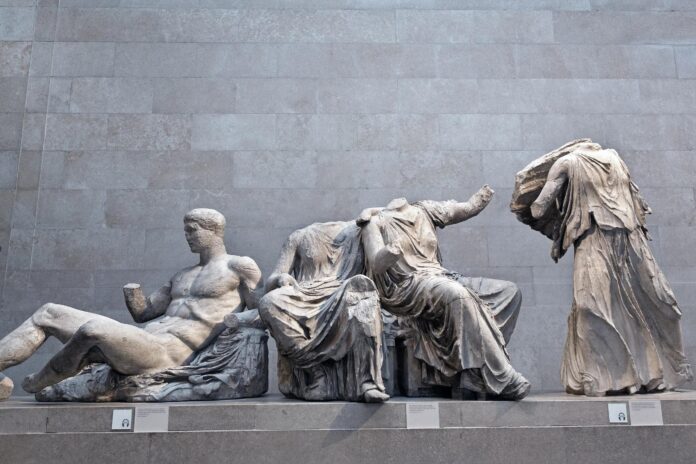A possible deal to return the Parthenon Marbles to Greece has not been jeopardised by the theft controversy engulfing the British Museum, according to the Financial Times, which reports that the museum’s chair, George Osborne, and Greek Prime Minister Kyriakos Mitsotakis are in ongoing talks over a “historic cultural swap”.
Under Osborne’s plan, Greece would not renounce its claim to the sculptures, but the British Museum would ship to Athens one-third or more of the Parthenon Marbles for a set period, where they are likely to go on display at the Acropolis Museum. Some Greek treasures would be sent to London in return as “collateral”.
Crucially, the Times outlines, Mitsotakis is playing a long diplomatic game. “You can read a lot into the silence,” said an anonymous source at the British Museum. “There has been considerable restraint at the heart of the Greek state.” (The Art Newspaper has contacted the British Museum for comment.)
However, the Greek culture minister, Lina Mendoni, said earlier this month that the ongoing furore “reinforces the permanent and just demand of our country for the reunification of the Parthenon Marbles at the Acropolis Museum in Athens”.
Her comments came after Peter Higgs, a senior curator of Greek and Roman art who was employed at the British Museum for 30 years, was identified in UK press reports as responsible for stealing priceless artefacts from the museum’s collection. Higgs’s family has denied the allegations against him.
In an interview on the BBC Radio 4 Today programme, Osborne estimated that around 2,000 items have gone missing. (The British Museum’s director, Hartwig Fischer, stepped down on 25 August.) A spokesperson for the British Museum told The Art Newspaper last week: “We won’t be commenting on any details of the thefts while they’re subject to a police investigation.”
In June 2022, Osborne had said there is a “deal to be done” over sharing the Parthenon Marbles with Greece, fuelling the long-standing debate over the restitution of the fifth-century-BC works that have been housed at the London museum since 1816—after they were removed from the Parthenon temple on the Acropolis in Athens by agents working for the Scottish nobleman Lord Elgin, then-ambassador to the Ottoman Empire. (The sculptures went on display in the British Museum in 1817.)
In January of this year, the British Museum confirmed in a statement that the institution was actively negotiating with the Greek government to return the Parthenon Marbles. A spokesperson for the British Museum said at the time: “We’ve said publicly we’re actively seeking a new Parthenon partnership with our friends in Greece, and as we enter a new year, constructive discussions are ongoing.”
In May, Mitsotakis said his government was exploring a “win-win” solution to the Parthenon Marbles issue. However, the prime minister, who was re-elected in June, ruled out any deal that would include the word “loan”, according to the Independent. Mitsotakis said: “We will never recognise that these sculptures are owned, legally owned by the British Museum … But again, we have to be constructive, and we have to be innovative if a solution is to be found.”
The 1963 British Museum Act currently prohibits a full return of the artefacts. Crucially, UK Prime Minister Rishi Sunak said on 13 March, when questioned about the Parthenon Marbles: “The UK has cared for the Elgin Marbles for generations. The collection of the British Museum is protected by law, and we have no plans to change it.”

























